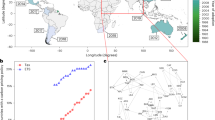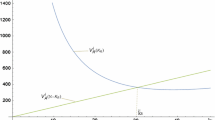Abstract
Using a stylized theoretical model, we argue that current economic analyses of climate policy tend to over-estimate the degree of carbon leakage, as they abstract from the effects of induced technological change. We analyse carbon leakage in a two-country model with directed technical change, where only one of the countries enforces an exogenous cap on emissions. Climate policy induces changes in relative prices, that cause carbon leakage through a terms-of-trade effect. However, these changes in relative prices also affect the incentives to innovate in different sectors. This leads to a counterbalancing induced-technology effect, which always reduces carbon leakage. We therefore conclude that the leakage rates reported in the literature may be too high, as these estimates neglect the effect of price changes on the incentives to innovate.
Similar content being viewed by others
References
Acemoglu D (1998) Why do new technologies complement skills?. Directed technical change and wage inequality. Q J Econ 113:1055–1089
Acemoglu D (2002) Directed technical change. Rev Econ Stud 69:781–809
Acemoglu D (2007) Equilibrium bias of technology. Econometrica forthcoming
Babiker MH (2005) Climate change policy, market structure and carbon leakage. J Int Econ 65:421–445
Barrett S (1994) Self-enforcing international environmental agreements. Oxf Econ Pap 46:878–894
Bates RW, Moore EA (1992) Commercial energy efficiency and the environment. World Bank Working Paper Series 972, World Bank
Burniaux J, Oliveira-Martins J (2000) Carbon emission leakages: a general equilibrium view. OECD Economics Department Working Paper 242, OECD Economics Department
Carraro C, Siniscalco D (1998) International environmental agreements: incentives and political economy. Eur Econ Rev 42:561–572
Copeland BR, Taylor MS (2005) Free trade and global warming: a trade theory view of the KYOTO PROTOCOL. J Environ Econ Manage 49:205–234
Di Maria C, Smulders S (2004) Trade pessimists vs technology optimists: induced technical change and pollution havens. Adv Econ Anal Policy 4(2) article 7
Drandakis E, Phelps E (1965) A model of induced invention, growth and distribution. Econ J CXXVI:823–840
Espey M (1998) Gasoline demand revisited: an international meta-analysis of elasticities. Energy Econ 20:273–295
Gately D, Huntington HG (2002) The asymmetric effects of changes in price and income on energy and oil demand. Energy J 23(1):19–55
Golombek R, Hoel M (2004) Unilateral emission reductions and cross-country technology spillovers. Adv Econ Anal Policy 4(2) article 3
Grubb M, Chapuis T, Ha Duong M (1995) The economics of changing course: implications of adaptability and inertia for optimal climate policy. Energy Policy 23(4/5):417–432
Hicks J (1932) The theory of wages. Macmillan, London
Hoel M (1991) Global environmental problems: the effects of unilateral actions taken by one country. J Environ Econ Manage 20:55–70
Kennedy C (1964) Induced bias in innovation and the theory of distribution. Econ J LXXIV:541–547
Kuik O (2005) Climate change policies, international trade, and carbon leakage: an applied general equilibrium analysis. Ph.D. thesis, Free University, Amsterdam
Light M, Kolstad CD, Rutherford TF (2000) Coal markets, carbon leakage and the KYOTO PROTOCOL. Center for Economic Analysis Working Paper 23, University of Colorado at Boulder
Newell R, Jaffe A, Stavins R (1999) The induced innovation hypothesis and energy-saving technological change. Q J Econ 114:941–976
Pindyck RS, Rotemberg JJ (1983) Dynamic factor demands and the effects of energy price shocks. Am Econ Rev 73(5):1066–1079
Popp D (2001) The effect of new technology on energy consumption. Resour Energy Econ 23:215–239
Popp D (2002) Induced innovation and energy prices. Am Econ Rev 92:160–180
Rivera-Batiz LA, Romer PM (1991) Technological differences. Q J Econ CXVI:531–555
Silberberg E (1990) The structure of economics: a mathematical analysis. 2nd edn. MacGraw Hill, London
Taheri AA, Stevenson R (2002) Energy price, environmental policy, and technological bias. Energy J 23(4):85–107
Author information
Authors and Affiliations
Corresponding author
Rights and permissions
About this article
Cite this article
Maria, C.D., van der Werf, E. Carbon leakage revisited: unilateral climate policy with directed technical change. Environ Resource Econ 39, 55–74 (2008). https://doi.org/10.1007/s10640-007-9091-x
Received:
Accepted:
Published:
Issue Date:
DOI: https://doi.org/10.1007/s10640-007-9091-x




